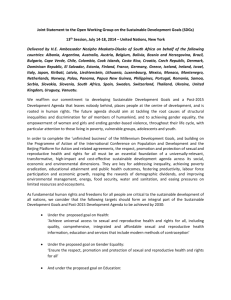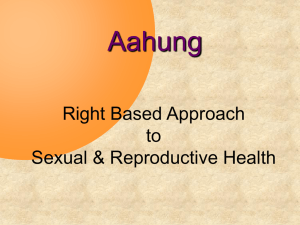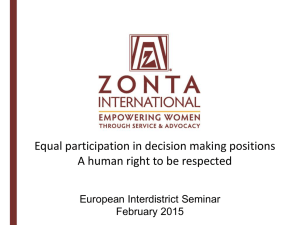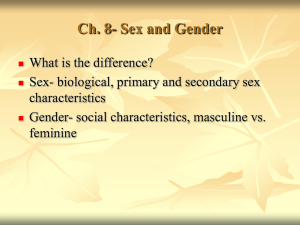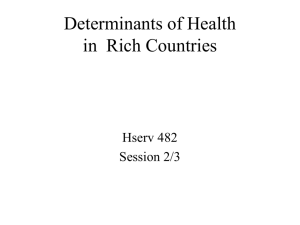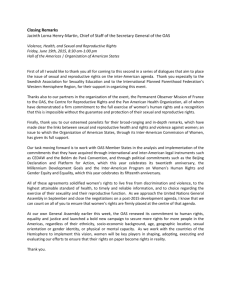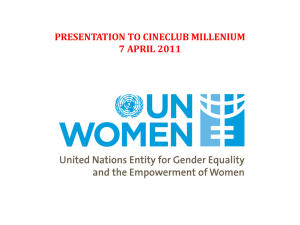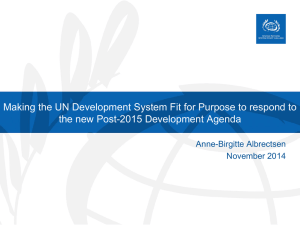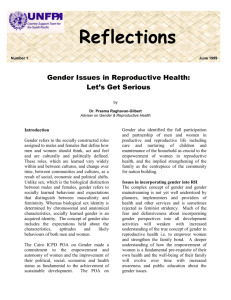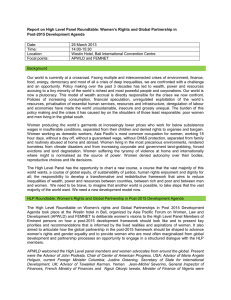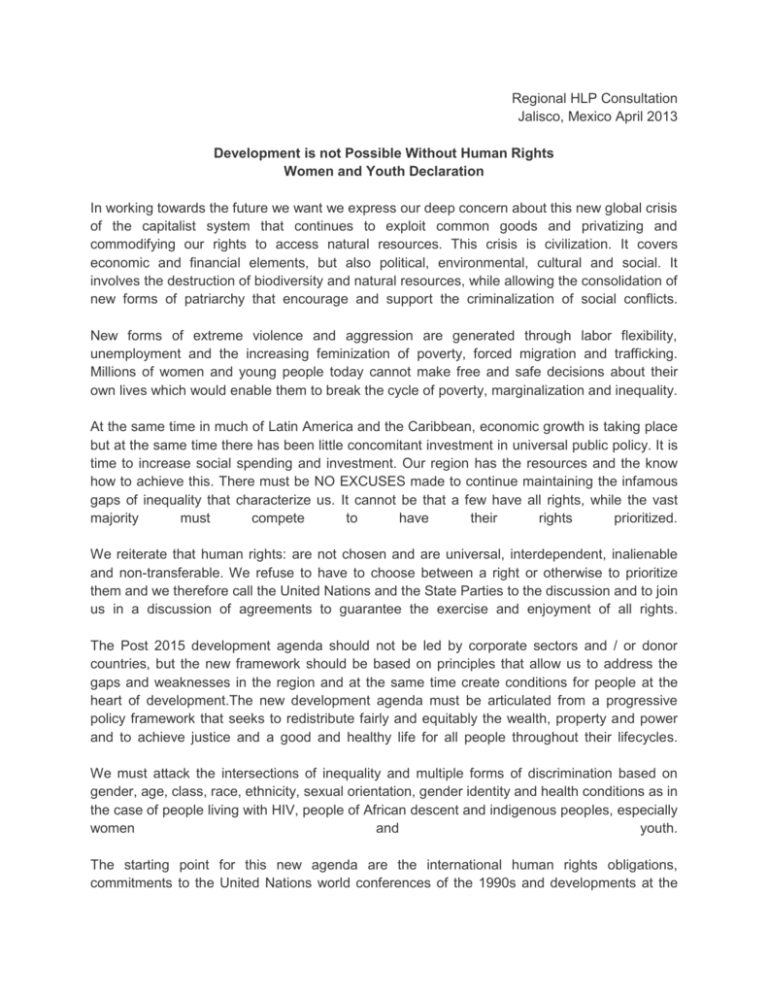
Regional HLP Consultation
Jalisco, Mexico April 2013
Development is not Possible Without Human Rights
Women and Youth Declaration
In working towards the future we want we express our deep concern about this new global crisis
of the capitalist system that continues to exploit common goods and privatizing and
commodifying our rights to access natural resources. This crisis is civilization. It covers
economic and financial elements, but also political, environmental, cultural and social. It
involves the destruction of biodiversity and natural resources, while allowing the consolidation of
new forms of patriarchy that encourage and support the criminalization of social conflicts.
New forms of extreme violence and aggression are generated through labor flexibility,
unemployment and the increasing feminization of poverty, forced migration and trafficking.
Millions of women and young people today cannot make free and safe decisions about their
own lives which would enable them to break the cycle of poverty, marginalization and inequality.
At the same time in much of Latin America and the Caribbean, economic growth is taking place
but at the same time there has been little concomitant investment in universal public policy. It is
time to increase social spending and investment. Our region has the resources and the know
how to achieve this. There must be NO EXCUSES made to continue maintaining the infamous
gaps of inequality that characterize us. It cannot be that a few have all rights, while the vast
majority
must
compete
to
have
their
rights
prioritized.
We reiterate that human rights: are not chosen and are universal, interdependent, inalienable
and non-transferable. We refuse to have to choose between a right or otherwise to prioritize
them and we therefore call the United Nations and the State Parties to the discussion and to join
us in a discussion of agreements to guarantee the exercise and enjoyment of all rights.
The Post 2015 development agenda should not be led by corporate sectors and / or donor
countries, but the new framework should be based on principles that allow us to address the
gaps and weaknesses in the region and at the same time create conditions for people at the
heart of development.The new development agenda must be articulated from a progressive
policy framework that seeks to redistribute fairly and equitably the wealth, property and power
and to achieve justice and a good and healthy life for all people throughout their lifecycles.
We must attack the intersections of inequality and multiple forms of discrimination based on
gender, age, class, race, ethnicity, sexual orientation, gender identity and health conditions as in
the case of people living with HIV, people of African descent and indigenous peoples, especially
women
and
youth.
The starting point for this new agenda are the international human rights obligations,
commitments to the United Nations world conferences of the 1990s and developments at the
regional level. The process of 2015 must NOT be built at the cost of exploiting women's rights.
Non-discrimination and real equality are crucial for all people to be able to make decisions
to
function
both
in
their
reproductive
and
productive
lives.
The inclusion and social justice are unavoidable requirement for sustainability and development
will only be achievable if it recognizes the diverse identities and incorporates equal numbers to
women.
Autonomy is essential in all areas of life: economic, political, sexual and reproductive health.
Latin America and the Caribbean should protect this autonomy which is consistent with the
commitments made to ensure the exercise of sexual and reproductive rights as human rights.
People should be free to decide on their life plans and for women this includes the right to safe
and legal abortion and to increase their ability to participate in development.
The post-2015 process must address the both the past and contemporary challenges of
humanity. The mobility of people continues to be a concern and so any future proposal should
consider a comprehensive and multidimensional approach that addresses the needs of migrant
women and men along with their family and community networks, recognizing the portability of
rights.
States should guarantee the right to a life free of violence and commit to prevent and eradicate
all forms of violence; including femicide, trafficking, violence faced by women, girls and young
women rights defenders humans, journalists, sex workers and women working in situations of
conflict
and
militarization.
Equality is the condition for sustainability. There are ecological limits to the growth paradigm in
which corporations and States prioritize profit above all else. However, a strong and guiding
principle is essential for sustainable and inclusive development. Sustainability policies must not
add the extra burdens of domestic work and unpaid work which have a disproportionate impact
on women. People, regardless of their status must be protagonists of their own development
and
not
just
victims
of
nature.
Education is key to breaking the vicious circle of inequality and poverty. It is necessary to
guarantee its availability, accessibility and affordability, as well as the recruitment and retention
of young people at all levels in educational institutions. Education should be: public, secular,
free, quality, intercultural and include comprehensive sexuality education. We should consider
policies that facilitate the transition from education to formal employment through investment in
alternative models of job training and the recognition of non-formal education programs.
Resources should be allocated for the implementation of policies that promote equal
opportunity and decent work to ensure social protection systems and full respect for labor
rights. It is essential to recognize that social reproduction is intrinsically linked to the productive
economy and consequently must be fully reflected in the design of macroeconomic policies.
The post-2015 framework should invest, as a priority, in the prevention and comprehensive
management of disaster risk that is gender-sensitive. Especially in the context of climate
change, designing goals and innovative strategies to reduce vulnerabilities is crucial.
The so-called "international cooperation for development", as well as South-South cooperation,
must start from the centrality of human rights, gender equality and multiculturalism to strengthen
democracy. The relations of equality, respect for autonomy and effective participation will only
be possible if you invest in strengthening organizations and groups and social movements,
especially
women
and
youth.
Health as a fundamental human right is a matter of public interest and is a precondition of
generating development. States have obligations to protect and ensure the highest attainable
standard of health and the preservation of sexual and reproductive rights are fundamental.
States need to address simultaneously all the macro determinants of health and its links with
inequalities. The new agenda should incorporate and reaffirm the right of everyone to the
enjoyment
of
the
right
to
health.
It is necessary to privilege the human right to food quality nutrition including access to clean
water and food sovereignty. In the discussion of a new agenda, we refuse to choose between
one right and another. Our region is one of inequalities; we have the world’s largest reserves of
water
but
yet
still
people
have
to
pay
for
bottled
water.
We demand a democratic and transparent process in developing the Post 2015 agenda; to
ensure monitoring mechanisms, including goals, targets and indicators for impact assessment
which are applicable to all stakeholders and are disaggregated, adequate, and timely. We
advocate that for progressive budgets and sufficient resources to ensure that everyone can
exercise their rights, with mechanisms for monitoring, evaluation, transparency and
accountability. To achieve the world that we want we must learn from the failures and never
allow
reductionism
and
fragmented
agendas.
We demand that the results of this regional consultation will be incorporated formally in the
national and regional processes and be sent to the High Level Panel to be incorporated in the
recommendations which will be presented at the UN General Assembly in September this year.
If equality is on the policy horizon, we require expanded democracy and a guarantee to ensure
the rule of law in states which are truly secular, managed transparently and accountable to
citizens.

